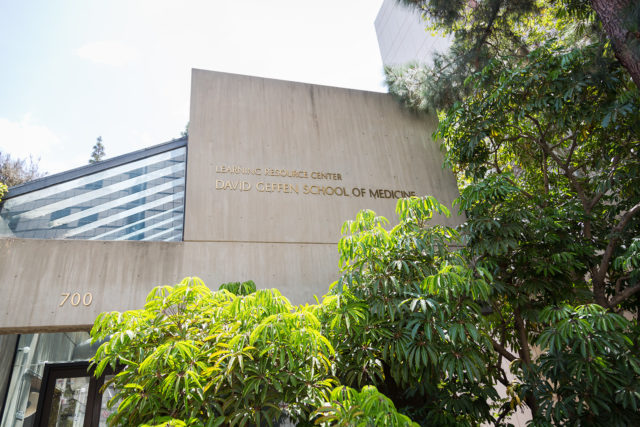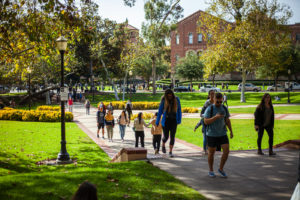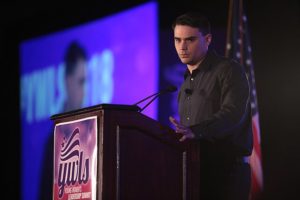On Oct. 16, 2023 – nine days after an attack by Palestinian political party and militant group Hamas killed around 1,200 people in Israel, and more than 2,700 Palestinians were killed by Israeli retaliatory airstrikes – UCLA Health administrative leaders sent an email to the medical community.
Signed by David Geffen School of Medicine Dean Steven Dubinett and UCLA Health Sciences Vice Chancellor John Mazziotta, its subject line read, “A call for compassion, empathy and kindness.”
“We are writing to acknowledge how profoundly our community has suffered following the deadly Hamas attack in Israel,” Dubinett and Mazziotta wrote in the email. “We have heard many concerns from both students and faculty about antisemitic messages that have made them feel unsafe. As a medical school we condemn violence in all its forms and our focus is to preserve life for everyone with compassion and empathy.”
The email made no direct references to the 2,700 Palestinian casualties.
Some community members – including Dr. Faysal Saab, an assistant clinical professor in internal medicine and pediatrics – saw the omission as taking a side. A spokesperson for UCLA and the medical school declined to provide comment on the email Tuesday.
“The timing of that email and the fact that the email was sent made it very clear that UCLA values the lives of one community more than another,” Saab said. “It felt like it needed to speak on behalf of the Israeli community, while it never felt like it needed to speak on behalf of the Palestinian community.”
He said this omission contributed to a hostile climate in the medical school – one that, according to a Jan. 31 report by the UCLA Task Force on Anti-Palestinian, Anti-Arab and Anti-Muslim Racism, has since continued. The task force claimed in the report that the School of Medicine has suppressed academic freedom and speech, not only with respect to pro-Palestine sentiments but also more broadly to racial justice.
The chairs of the task force alleged in a March letter that Chancellor Julio Frenk has refused to respond to their complaints.
UCLA medical trainees, including medical students and residents, described what they saw as a punitive culture in which faculty and students targeted trainees speaking about Palestine – actions that the task force claims are a violation of UC codes of conduct and California law. Complaints made via administrative process were ignored or passed off to other offices without resolution, according to the task force.
Ultimately, the trainees said they hope to see the university institute anti-doxxing policies and hold those involved accountable.
“I’m glad that this report came out and that this is being talked about. I’m also simultaneously very frustrated this is something that we have to talk about and deal with. … It detracts from the real issues – which is that there is a genocide happening,” said psychiatry resident A, who requested anonymity to avoid doxxing. “That’s the whole reason, essentially, that we’re being attacked.”
The task force, commissioned by Executive Vice Chancellor and Provost Darnell Hunt, previously published reports condemning the police response to last spring’s Palestine solidarity encampment and the subsequent increased security presence on campus. Sherene Razack, one of the task force’s co-chairs and a distinguished professor of gender studies, said the task force’s third report came after it was approached by medical students who wanted to share their experiences.
“These people went in with extremely high ideas, which they have to this day,” she said. “They have to experience something like getting targeted and persecuted for even mentioning that children were being killed in Gaza, that medics were being killed in Gaza – and for that, they could have their careers ruined.”
Multiple trainees said they originally came to UCLA believing it was a place to pursue racial justice.
But the medical school has a history of race-related discrimination allegations, including a 2012 lawsuit in which a Black surgeon alleged he had been repeatedly humiliated by colleagues and depicted in racist caricatures.
The subsequent 2013 Moreno Report – commissioned by then-Chancellor Gene Block and then-Executive Vice Chancellor and Provost Scott Waugh – concluded that UCLA had inadequate structures to respond to discrimination reports, though the associate dean for diversity affairs claimed at the time that it had only received one discrimination complaint since 2009. A 2021 follow-up report found that though action had been taken on some of the Moreno Report’s recommendations, UCLA still had work to do to improve the campus climate for faculty of color.
Additional concerns raised by the task force build on that historical context and allege that Black faculty have continued to face disproportionate harassment.
Medical student B – who requested anonymity out of fear of personal and professional retaliation from UCLA Health – recalled an incident in which an administrator was recorded complaining about the “Asian student who always sits in the first row” but never faced public consequences. Student B added that they believe faculty of color also face disproportionate scrutiny.
One example Student B mentioned was the appointment of Dubinett over Dr. Clarence Braddock – a former executive vice dean who is Black – as medical school dean when the predecessor stepped down. Students at the time said in an email that they believed the school overlooked Braddock’s qualifications in part because of his race and found the choice “extremely concerning.”
[Related: Medical students vocalize opposition to newly appointed interim dean]
Saab, who has been at UCLA since medical school, said he has experienced anti-Arab racism throughout his entire career – but added that he believes medical school leadership has significantly escalated its interference in academic freedom by suppressing pro-Palestine perspectives since Oct. 7, 2023.
He cited an April 2024 incident in which Resident A and another psychiatry resident delivered a talk on the pathologization of marginalized peoples’ resistance to oppression. Before the talk even occurred, it was flagged to department leadership – something Resident A believes was because of the pair’s Arab surnames, as no other information had been made public.
The residents said during the talk that the self-immolation of Aaron Bushnell – an active-duty air force officer who ignited himself in front of the Israeli embassy in Washington, D.C., declaring that he would not be “complicit in genocide,” according to the Associated Press – constituted a form of protest, not necessarily mental illness. Screenshots and recordings of the talk, including the pair’s names, were posted on Instagram, Resident A said.
“I, obviously, kind of was spiraling. I was reading comments. I put a Google alert for my name,” they said. “That’s when the articles started pouring in about us and stating that we were antisemitic – that we were promoting self-harm, that we were negligent, committing malpractice.”
Resident A said they received death threats, and someone published an old address of theirs online. They added that they and dozens of other trainees filed complaints through the school’s Mistreatment Incident Reporting Form. Resident A also said they filed a Title VII report with the Civil Rights Office, and multiple residents wrote a letter to medical school leadership asking for action to be taken.
Resident A said they received no response from the school.
Beyond individual targeting, trainees also alleged the medical school has broadly suppressed speech in support of Palestine and racial justice.
Student C – a fourth-year medical student who requested anonymity due to fear of professional retaliation from UCLA Health – said one incident involved the Health Equity Hub, a space founded in 2017 by medical students. In November, equity, diversity and inclusion deans from the schools of Medicine, Nursing, Medicine and Public Health emailed current students, saying that an incoming student had complained that an item in the hub made them feel unsafe, Student C said.
Following the email, Student C said all students’ card access to the hub was revoked for more than 72 hours. When they returned, they said the walls of the hub – which previously had posters related to subjects such as social justice and cultural health practices – were empty, and two pro-Palestine pamphlets were gone.
Student C said the EDI deans, when asked why the walls were empty, cited Time, Place and Manner policies limiting what can be posted on internal structures. The policies ban people from affixing posters to the exterior of any UCLA property or interior of UCLA property if it is visible to those outside the building.
Approved interior material can only be posted if it adheres to the regulations of a pertinent university unit, according to the guidelines.
[Related: UCLA set to revise Time, Place and Manner policies, expand public expression areas]
The medical school spokesperson did not provide further comment on the alleged violation.
“That that repression is even coming there (the hub), I think, makes students feel even less safe and less supported in their ability to exercise their freedom to advocate for these issues and to learn in this way about a fundamental issue of medicine – which is racial and social justice,” Student C said.
Students also said that the medical school has pulled back on its Structural Racism and Health Equity course, which was introduced in 2021.
According to the report, the SRHE course was reduced from 30 to 24 hours of instructional time in the 2024-2025 academic year. The course has repeatedly been the focus of media attention – including an editorial from The Wall Street Journal that called the program’s racial caucusing exercise, in which students split into groups by race to discuss antiracism, “illegal.”
Student D, a third-year medical student who was granted anonymity out of fear of retaliation from UCLA Health, acknowledged that students, especially multiracial students, might have varied perspectives on racial caucusing. However, they said they believe racial caucusing creates safe spaces for white students to grapple with race and nonwhite students to talk freely about their experiences with racism.
SRHE’s community guest speakers have also received attention. The Washington Free Beacon reported April 2, 2024 that one speaker led “pagan” prayers and pro-Palestine chants. The outlet also posted a portion of an audio recording of the lecture.
The recording’s origin was not disclosed, but UCLA Student Conduct Code states that “no Student will give, sell, or otherwise distribute to others or publish any recording made during any course presentation without the written consent of the University and the instructor/presenter.” The UCLA Health spokesperson did not provide comment on how the recording was released.
But Student C, who is involved with the course, said they believe the program’s speakers provide students with information from people actively working in the medical field. Student C said guest speakers have been suspended from only SRHE programming, and not other curricula, since May – a move that they called “discriminatory treatment and disproportionate repression.”
A faculty member interviewed by the task force also alleged that Dubinett and Mazziotta attempted that month to suspend the SRHE course – violating UCLA Academic Senate bylaws that require changes to go through the school’s Faculty Executive Committee.
Sessions this year have continued to be canceled without explanation, Student C said. Saab also alleged that Dubinett’s office intervened to cancel a longstanding seminar that touched on Palestinian rights.
The task force alleged in the report that multiple of these changes are tied to complaints made by the Jewish Faculty Resilience Group at UCLA – whose leadership includes multiple medical faculty members.
The report also alleged that JFrg was involved in multiple incidents of organized harassment of those speaking in support of Palestine. For example, the report said the recording of Resident A’s talk was posted on JFrg’s website, and the faculty member who made the recording admitted at a Faculty Executive Committee meeting to doing so.
JFrg’s code of conduct states that members “do not threaten or physically intimidate people with different views.” A Feb. 9 JFrg statement said the task force’s accusations were false and lacked evidence, and pointed to alleged examples of rising antisemitism at the school, such as decreased Jewish student enrollment.
Representatives from JFrg did not respond in time to an additional request for comment.
All of JFrg’s leadership team are among the more than 60 faculty affiliated with the School of Medicine who signed a December 2023 letter that alleged pro-Palestine rallies on campus celebrated Hamas’ attack.
Given that medical students are reliant on faculty for evaluations and letters of recommendation, Student C said it scared them to see supervisors label students as terrorists and call for discipline. Student C also alleged that no-hire lists with the names of students critical of Israel are already in circulation among faculty involved in resident selection.
Resident A said their April 2024 doxxing continues to affect their career. Patients often search for their psychiatrist online before meeting them, they said, and some of the first results under Resident A’s name are articles about the talk.
“I don’t know if my patients have preconceived notions about me or what I stand for,” Resident A said.
Student B said they have scrubbed their internet presence, despite previously wanting to be available online for people potentially seeking mentorship.
“Witnessing the kind of death threats that I’ve had friends and mentors subjected to – witnessing that, and witnessing the violence of the university against its own students in the encampment … has personally had a very chilling effect,” they said.
[Related: Medics, physicians recall ‘dystopian’ violence of encampment attack and sweep]
The medical school spokesperson said in the emailed statement that the university is reviewing the task force’s recommendations.
“The medical school is committed to fostering an inclusive environment that makes all members of our academic community safe, respected, valued and heard,” they said in the statement.
Saab said he feels an obligation to continue speaking out and standing up for trainees and added that he hopes to see a distinction made between criticisms of Israel and antisemitism. Student B said they would like Chancellor Frenk to call for another investigation into the medical school and revisit the recommendations from the original 2013 report.
All the interviewed trainees said they would like to see the university formally implement policies against doxxing – which is a misdemeanor under California penal code – in the official code of conduct. Resident A added that the university should also provide support for trainees who are doxxed.
Student B said they are concerned about the ramifications for diverse patient care if academic freedom continues to be suppressed.
“Everybody’s entitled to the processes of justice. … That’s also fundamentally what the struggles in the summer of 2020 were – at its core was the struggle for justice,” Student B said. “We continue in that fight – (because) that justice, racial justice, does not exist in medicine.”




Comments are closed.